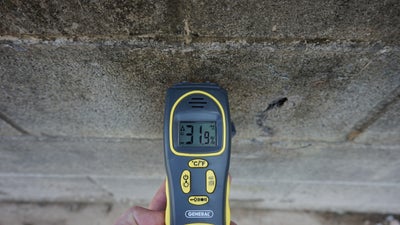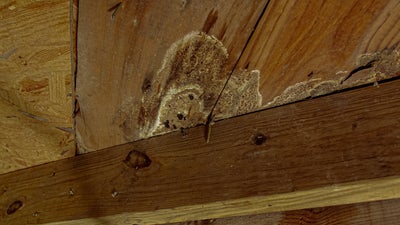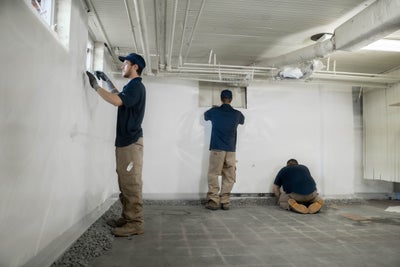Can You Close Your Basement Vents During The Summer?

Are you tempted to open all your vents and windows when the “summer wind comes blowin’ in?” While properly ventilating and airing out your home are important, some mechanisms, like basement vents, could potentially do more harm than good.
“Should I open or close basement vents, especially during the summer?” is an age-old question many homeowners ask. The answer isn’t as cut-and-dry as you might think.
This article covers the advantages and disadvantages of basement vents in summer so you can make the best decision for your home. It also explains how local basement waterproofing experts can help protect your home.
Closing Basement Vents: The Benefits
By opting to close basement air vents, you reap several benefits, including:
Reduced Humidity Levels

If you feel the effects of humid summer days, your basement will, too, if vents are left open. Open vents allow humid, unconditioned air inside, increasing indoor humidity levels and causing condensation and mold.
When vents are closed, this helps keep indoor humidity lower—the ideal level is at or below 50%. This helps prevent dangerous mold and damp conditions that can affect the health of your home and family.
Cost Savings
As the summer temperatures soar, your electricity bills are likely to follow suit. This surge can be attributed to the increased workload placed on your HVAC system as it strives to maintain comfortable indoor temperatures. Closing basement vents can help mitigate these escalating costs.
Prevent Structural Damage

Humid air can also lead to wood rot, a fungus that thrives on wooden structures like support beams, gradually breaking them down over time. The wood floors throughout your home also can warp and rot.
By addressing basement ventilation and the resulting humidity, you effectively safeguard against the insidious damage caused by wood rot, mold, and moisture buildup, ultimately saving you from the hassle and expense of extensive repairs and replacements.
Fewer Pest Infestations
If pests want to enter your home, they’ll find a way. An open basement vent, however, invites bugs, small animals, and other nuisances to freely enter and wreak havoc. They are also drawn to humid areas, making your basement their ideal home.
Keeping vents closed keeps the pests out.
Improved Indoor Air Quality and Safety

Hot and humid outdoor air can introduce allergens, dander, dust mites, and potentially toxic particles into your basement. These particles permeate the air, making it stale and unpleasant. The stack effect can worsen the problem by facilitating the upward movement of the air and particles into the rest of your home.
Closing basement vents prevents the influx of these airborne contaminants, ensuring a fresher and more comfortable indoor environment for you and your loved ones.
Over time, these benefits collectively translate into increased basement protection. However, it’s important to consider the side effects of leaving vents sealed for too long. We’ll explore this aspect in the next section.
The Disadvantages of Closed Basement Vents
You also might experience more issues than you anticipated if you seal off too many basement vents for extended periods, such as:
- Air Pressure Buildup: As previously mentioned, the air within your home may not circulate as efficiently as desired with closed vents. To prevent obstructions from forming in your ductwork, it’s advisable to alternate the vents you close periodically.
- Leakage Risks: If the pressure from restricted airflow becomes excessive, it can potentially cause leaks to develop in your duct system. These leaks can be problematic, as they are often challenging to locate and can substantially disrupt the comfort levels of a temperature-controlled home.
- Increased Energy Costs: Leaks can lead to higher utility bills, as your HVAC system will have to work harder to compensate for the sudden loss of air pressure in certain areas of your home.
- Frozen AC Coils: If your air conditioning system operates for extended periods during the day, the air escaping through a leak can circulate past the active coils, potentially causing them to freeze, especially if the air contains significant levels of condensation.
Be mindful of these potential issues and take appropriate precautions. Periodically alternate the vents you close and promptly address any suspected leaks to alleviate the risks associated with restricting airflow in your home.
Open vs. Closed Basement Vents In Summer: The Verdict
Considering the potential advantages and disadvantages of closing your basement vents, is it a worthwhile endeavor to seal them off during the warmer months of the year, particularly if your aim is to realize cost savings?
Temporarily closing the air vents for a day or two is unlikely to harm your home. However, you should make a conscious effort to reopen the basement vents or rotate the vents you have closed. This ensures air circulates freely throughout your home without obstructions or backups. Additionally, you may consider installing a basement dehumidifier to further aid in moisture management.
Invest in Professional Basement Waterproofing Solutions
A dehumidifier alone will not cure every basement moisture issue, but it is part of a comprehensive basement waterproofing system. These measures help maintain a dry and secure basement environment during the summer months and throughout the year.
When you partner with basement waterproofing professionals like Groundworks, we complete a thorough basement inspection and recommend tailored solutions, including:

Get Trusted Basement Solutions Near You!
Warm summer air is a major contributor to airborne basement moisture accumulation. Don’t allow the sweltering heat to transform your basement into an uncomfortable, humid, and damp dungeon. Trust the local professionals at Groundworks for lasting solutions.
Groundworks has the expertise and resources to help you gain control over outdoor air intrusion, enabling you to establish a welcoming and comfortable atmosphere in your basement. Contact us today to schedule your free inspection and obtain a comprehensive estimate tailored to your home’s specific needs.